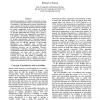Free Online Productivity Tools
i2Speak
i2Symbol
i2OCR
iTex2Img
iWeb2Print
iWeb2Shot
i2Type
iPdf2Split
iPdf2Merge
i2Bopomofo
i2Arabic
i2Style
i2Image
i2PDF
iLatex2Rtf
Sci2ools
105
click to vote
ALIFE
2005
2005
Modular Interdependency in Complex Dynamical Systems
Hierarchical modularity is a familiar characteristic of a large class of natural dynamical systems. A normal interpretation of modularity is that interactions between subsystems are sparse compared to interactions within subsystems and this leads some to assume that the interactions between modules are largely unimportant. In the evolution of complex systems, if a system can be decomposed into modules that are basically independent then evolving such a system is greatly aided. However, this interpretation of modularity is over-simplistic. Specifically, although modules may be sparsely connected, dynamical properties of modules may be strongly interdependent, and if functional properties depend on dynamical properties then interactions between modules may be critically important. If inter-module dependencies are significant then resolving the dependencies between modules is problematic, and simple evolutionary processes can be inadequate. However, `compositional' evolutionary mech...
Related Content
| Added | 15 Dec 2010 |
| Updated | 15 Dec 2010 |
| Type | Journal |
| Year | 2005 |
| Where | ALIFE |
| Authors | Richard A. Watson, Jordan B. Pollack |
Comments (0)

